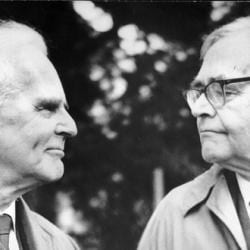The third book I read in my Nouwen binge was Creative Ministry. It reimagines 5 of the different roles that Nouwen sees Christian ministers having: teaching, preaching, visitation, activism, and celebration. Of course to Nouwen, all Christians ARE ministers, ordained pastors are simply an intensified version of minister. So here are some quotes with commentary as with the other two books.
“Prayer is not a preparation for work or an indispensable condition for effective ministry. Prayer is life; prayer and ministry are the same and can never be divorced. If they are, the ministry becomes a handyman and the priesthood nothing more than another way to soften the many pains of daily life.” (Introduction)
I think we should set aside time to focus exclusively on a conversation with God. But we should also see everything we do as part of that conversation. The more versed we are in God’s Word, the more we can walk through life in constant prayer. Everything that we see and experience in creation can reflect the image of its Creator and thus participate in our perpetual conversation with Him but we gain none of this if we don’t have the sanctified thought-life to receive what the Spirit is constantly trying to tell us.
“Much of the happiness in our lives is derived from the fact that we can give and that our friends have been willing to receive our gifts.” (17)
I think what we need as people more than anything is to be needed or at least valued. That’s part of the beauty of the body of Christ (understood correctly). We are redeemed not simply by having our individual relationships with God made right but by receiving a part of God’s mission in which we can contribute in a meaningful way. As a pastor, my most important gift to others is to empower them to give their talents to the kingdom (as opposed to asking them to give only money to pay for my talents).
“Only in the depths of his loneliness, when he has nothing to lose any more and does not cling any longer to life as to an inalienable property, can a man become sensitive to what is really happening in the world and be able to approach it without fear.” (19)
This describes the vulnerability which Jesus’ witness of vulnerability instills in each of us. Empathy is not possible without vulnerability because fear and defensiveness prevent others’ suffering from touching our hearts. It is only through entering a body that was broken that we who are broken can be made whole through our communion with Christ and each other.
“In a true dialogue the preacher cannot stay on the outside. He cannot remain untouchable and invulnerable. He has to be totally and most personally involved… When this dialogue takes place, those who listen will come to the recognition of who they really are since the words of the preacher will find a sounding board in their own hearts.” (35)
This is part of Nouwen’s chapter on preaching. I believe very strongly that preaching must be part of an ongoing conversation between the pastor and the congregation for two reasons. First I believe that God speaks to me through my congregation as part of my perpetual prayer. Secondly I need to know what my people are facing in their lives in order to help them hear the word God has especially for them.
“A preacher who wants to be a real leader is the man who is able to put the full range of his life-experiences… at the disposal of those who ask him to be their preacher.” (38)
As Nouwen clarifies, this doesn’t mean talking incessantly about yourself when you’re preaching. It simply means that my proclamation is less an academic research project and more of an ongoing travelogue o my journey with God.
“Contemplation is not just an important aspect of the life of the priest… Ministry is contemplation. It is the ongoing unveiling of reality and the revelation of God’s light as well as man’s darkness… It is the continuing search for God in the life of the people we want to serve. The paradox of the ministry indeed is that we will find the God we want to give in the lives of the people to whom we want to give Him.” (63)
This passage comes up in Nouwen’s chapter about pastoral visitation. He says that our task is not primarily problem-solving but helping people renarrate their lives seeing God’s hand at work within them.
“As long as we want to change the condition of other people because we feel guilty about our wealth, we are still playing the power game and waiting for thanks. But when we start discovering that in many ways we are the poor and those who need our help are the wealthy… [we] discover that [our] task is not a heavy burden or a brave sacrifice but an opportunity to see more and more of the face of Him whom [we] want to meet.” (84)
This is a good summary of what mission looks like with the wrong motives and the right motives. We go out into the world to be Christ to others and to meet Christ within them. This only makes sense if we realize that Jesus is not our property.
“Only a man of prayer can lead others to celebration because everyone who comes in contact with him realizes that he draws his powers from a source they cannot easily locate but they know is strong and deep. The freedom that gives him a certain independence is not authoritarian or distant. Rather, it makes him rise above the immediate needs and most urgent desires of the people around him. He is deeply moved by things happening around him, but he does not allow himself to be crushed by them… In all that he says and does, he proves to have a vision that guides his life. To that vision he is obedient.” (108-109)
I want to be a man of prayer who doesn’t get yanked into trivial quarrels. I want to have God’s vision for the life of our church. Notice that having a transcendent perspective does not imply dispassion as it does for the Kantians. You can care
infinitely but not be a rudderless romantic owned by your feelings.











